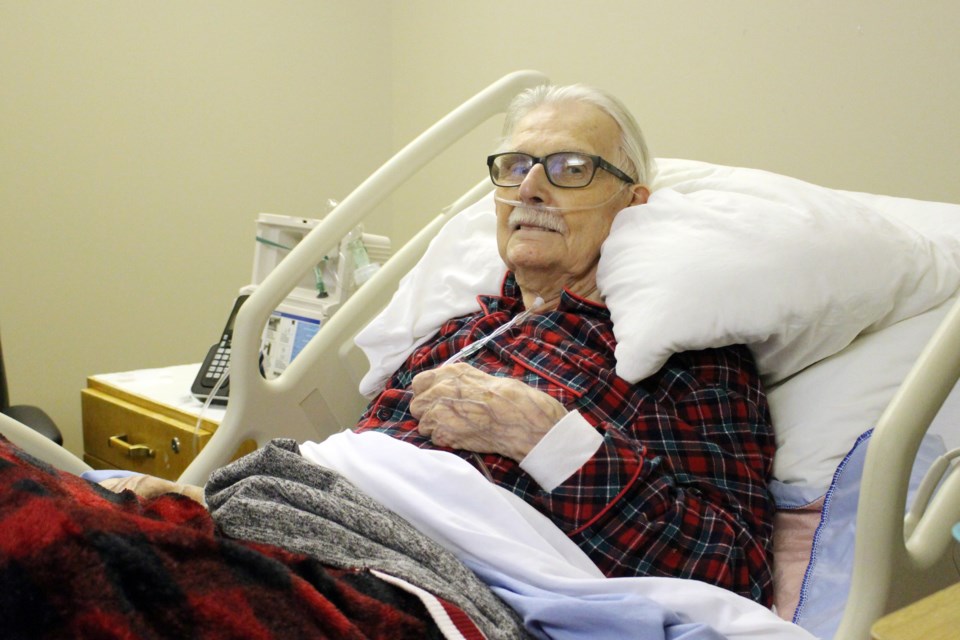BONNYVILLE – Joining the military was a spur of the moment decision for Ardmore-native George Lacquement, one that completely altered his life.
Lacquement enlisted in the military in 1942 at the height of the Second World War. He was just 17-years-old at the time, and later became a tank operator.
Reflecting on his time in battle, one of the memories that sticks out was June 6, 1944. He was in England with the Canadian armoured division, and recalls the sky being black with planes.
“I was sitting in the (Thursley) commons waiting to see if the Germans were going to counter attack or what was going to happen because we were all issued live ammunition. Our tanks were all fuelled up,” he told the Nouvelle from his room in the long-term care at the Bonnyville Health Centre.
He added, “There was a lot of activity going over, and a lot of activity coming back. There were lots of ships going across the water. It was a busy day. Not only that day, but that was the beginning of many days.”
During his time in the military, Lacquement worked as a driver and mechanic for armoured vehicles. Although that was his main role during the war, the local veteran was a jack-of-all-trades, ready to take on any job from an injured comrade.
“When you were in the army in the tanks, you did everything,” he said. “Canada didn’t have a big army, they had to utilize all the people that they had.”
Lacquement’s regiment, the First Canadian Armoured Carrier Regiment, became known as the ‘Kangaroos’ toward the end of the war. The name was representative of how they used their tanks as armoured infantry carriers, entering the battlefield with soldiers who would jump out in enemy territory.
“It was a big surprise,” Lacquement noted.
Although he couldn't remember exactly when, Lacquement recalled a attending a showing of the Plainsman in Antwerp, Germany, when the theatre was blown apart. Lacquement was transported to an American hospital, and it was during this time the Canadian military lost track of him, and his family received a notice that he was missing in action.
“I guess when I didn’t report back to my outfit, they didn’t know what happened to me. No one did.”
After over a month of wondering if he was dead or alive, a member of the Red Cross recognized his name and his loved oneswere notified he was still alive.
When the war ended in 1945, Lacquement didn’t head straight home. He worked as a transport sergeant, and spent about a year teaching for the army.
“They gave me a group of young fellas that also wanted to… learn mechanics, because most of them didn’t know a (wrench) from a hammer,” he explained.
It wasn’t until 1946 when Lacquement finally made it home, but life was far from back to normal. The Second World War veteran was in his own personal battle, struggling with mental health. He had a short temper and was easily irritated.
“It was called shell shock. Just a couple of miles from where I lived, one fella passed away from it a month after he was home.”
After the death of his first wife, Lacquement met Marge and the couple married in 1989.
She remembers the struggles her husband experienced and how it impacted his family.
“When you talk to his kids now, he wasn’t easy to live with. He’d fly off the handle at any little thing, and you couldn’t talk any sense into him,” Marge explained.
The now 95-year-old was diagnosed with Post-Traumatic Stress Disorder (PTSD) almost five decades after his time in the military. He’s been on medication ever since, and he’s noticed a significant change as a result.
“If I don’t take it… then I notice it. There’s a huge change,” expressed Lacquement, adding he wished he had been diagnosed earlier.
“If I had medication sooner it would have helped… in my first marriage and with the children.”
Even though he’s been through so much, Lacquement is described by registered nurse Michelle Mulligan as a “complete sweetheart.”
“He talks all the time, so we know he has been through some pretty horrific things in life because of the things he’s seen and done. For him to be such a sweet, giving soul and so thankful for every moment is amazing,” said the long-term care employee.
Lacquement keeps the local nurses on their toes with his jokes. Mulligan recalls when he received a water gun, and staff had to be on the look out when entering his room to prevent themselves from being hit by water.
“He’s intelligent, funny, and sharp as a tack… He’s grateful for everything everyone does and is very gracious,” Mulligan exclaimed.
Sitting in his hospital room is a collage of photos from his years spent in the military, including a photo of his grandfather, who served as an officer in the French army during the First World War. In their home, Marge holds onto a box filled with memorabilia from his time as a solider, which he often looks through with family and friends.
Before going to live at long-term care, Lacquement was active in the local legion and has held a membership card since 1943. He often attended Remembrance Day ceremonies, and shared his story with students.



